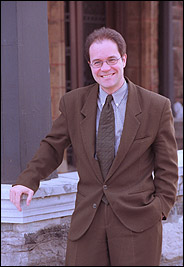Giving his take on a titan
Having rushed uphill to his Peel Street office, Jean-François Gaudreault-DesBiens is a little winded and slightly red-faced when he finally sinks into his chair. The law professor is apologetic for arriving five minutes late to discuss his newly published book.
 Professor Jean-François Gaudreault-DesBiens
Professor Jean-François Gaudreault-DesBiensPHOTO: Owen Egan |
|
The tardiness was certainly unintentional, since he's most eager to get talking about his paperback, Le sexe et le droit: Sur le féminisme juridique de Catharine MacKinnon (Liber & Yvon Blais, 171 pages).
Translated as "Sex and the Law," the book examines the legal legacy of Catharine MacKinnon.
If her name sounds familiar, MacKinnon is the legal scholar who's known as one of North America's most influential feminist legal theorists of the last 25 years.
Venerated by some and dismissed by others, she has helped define what constitutes sexual harassment, has asserted that rape laws are written to protect the perpetrators rather than the victims and has largely denounced pornography as an instrument of misogyny.
MacKinnon's writings played a key role in persuading Canadian lawmakers to set up tough anti-pornography laws and in persuading the U.S. Supreme Court to adopt the view that sexual harassment is a form of sexual discrimination.
What's more, MacKinnon has criticized the legal system as a man-made tool for female subordination.
Gaudreault-DesBiens was keen on dissecting MacKinnon's work because of her wide-ranging influence. "To use an astronomical metaphor," he writes in Le sexe et le droit, "one could say that within the feminist legal milieu, Catharine MacKinnon plays the role of the sun. Everything revolves around her theses."
But don't think Gaudreault-DesBiens picked MacKinnon as his subject because he's a feminist. Or an anti-feminist for that matter. While at 35 he is definitely a child of post-feminist influences, he says writing the book was an objective intellectual exercise. "I worked hard not to write a caricature of MacKinnon's work," he stresses.
Gaudreault-DesBiens adds he has great respect for MacKinnon's work, though he remains skeptical about some of her stances. There is no question that MacKinnon has forced judges and lawmakers to reconsider the way that laws treat women. But he believes she overstates her case at times.
For instance, he questions MacKinnon's espousal that relations between men and women are comparable to the worker-employer struggles described by Karl Marx. He also questions MacKinnon's "abuse" of the legal system, how she targets the courts as a strategy for effecting profound societal changes. "While the law may be a useful tool for social change," he says, "it still has its limitations and most of the changes it brings about are cosmetic."
The McGill author first fell upon MacKinnon's work while researching his first book on art censorship: La liberté d'expression entre l'art et le droit (Université Laval Press/Liber Presses, 300 pages).
"As I was doing my research for that book," he recalls, "MacKinnon's name kept coming up almost every time there was a request for art censorship."
That initial intrigue led him to pen a first essay on MacKinnon, which he expanded into a book. Before that, Gaudreault-DesBiens's main teaching and publishing interests had been focused on constitutional law, comparative federalism, legal theory, corporate law and the relations between law, culture and the arts.
As for anyone who feels a heterosexual male can't write objectively about a feminist, Gaudreault-DesBiens counters it's erroneous logic.
"That's like saying only women can write on women, francophones on francophones and aboriginals on aboriginals."
The book recently drew high praise from the influential Le Devoir. Reporter Alain-Robert Nadeau described Gaudreault-DesBiens's new book as a "remarkable" work: "Le Sexe et le droit is to the intellect what opera is to the senses: intelligent, complete and calming."
Nadeau added that after reading Le sexe et le droit, he thought, "All judges from the Supreme Court of Canada should read it, too."
Gaudreault-DesBiens hopes that glowing review might persuade a few people outside legal circles to peruse Le sexe et le droit as well. But as proud as he is of his work, and as much as he tried to broaden its appeal while writing it, he chuckles, "This won't be a Harry Potter."

